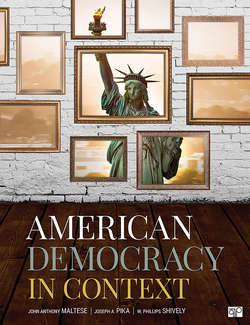Читать книгу American Democracy in Context - Joseph A. Pika - Страница 58
На сайте Литреса книга снята с продажи.
The Sugar Act and Stamp Act
ОглавлениеThe first seeds of revolution were planted in 1764 when Parliament enacted the American Revenue Act, better known as the Sugar Act. People in England had been complaining of too many taxes, and so Parliament used the act to shift some of the tax burden to the American colonists. The Sugar Act imposed duties on certain foreign goods imported into the American colonies—sugar and other goods, including coffee, some wines, and pimiento.
The timing could not have been worse, as the colonies were facing a bad economy. Not only did the new duties on imported goods increase prices for the colonists, but they also hurt American manufacturers of rum by making ingredients more expensive. As a result, the American rum trade was threatened to be priced out of the market; foreign buyers who had previously imported American rum now turned to other sources. Colonists reacted harshly to the Sugar Act. They quickly took up the rallying cry of “no taxation without representation.” The Massachusetts assembly proclaimed that the act deprived the colonists of “the most essential Rights of Britons.”6
Parliament made matters even worse for the colonists by imposing the Stamp Act the following March. From 1756 to 1763, the British had fought the French and Indian War in Canada and on the western frontier of the colonies; these battles were part of a larger struggle among a number of countries that transpired in Europe and elsewhere. British victory in the French and Indian War had left the country deep in debt, and the Stamp Act was an attempt by Parliament to raise money, ostensibly to pay for Britain’s continued military presence in North America after the war. The act imposed a direct tax on a wide array of printed materials in the colonies, including everything from legal documents to newspapers to playing cards. Such materials had to either be printed on specially marked paper or have tax stamps affixed to them to indicate that the tax had been paid.
American newspapers bitterly opposed the Stamp Act. The Pennsylvania Journal showed its displeasure by marking the location where the stamp would be placed with a skull and crossbones in its October 24, 1765 edition.
Fotosearch / Getty Images
The Stamp Act galvanized the colonies. Several colonial assemblies adopted resolutions denouncing the tax. The first and most famous was a series of resolutions passed by the Virginia House of Burgesses on May 29, 1765. These Virginia Stamp Act Resolutions (also known as the “Virginia Resolves”) stated that “the taxation of the people by themselves, or by persons chosen by themselves to represent them, … is the distinguishing characteristic of British freedom.”7 In so doing, the Virginia Resolves invoked the spirit of the Magna Carta and the English Bill of Rights.
Stamp Act Congress The first national meeting of representatives from the colonies in 1765. In response to duties (taxes) imposed by Parliament on the colonies through the Stamp Act, this Congress passed a Declaration of Rights that denounced taxation without representation—an important step toward the American Revolution.
The Stamp Act also provoked representatives from nine of the thirteen colonies to gather at Federal Hall in New York in October 1765.8 This so-called Stamp Act Congress was the first official meeting of representatives from the various colonies, and it resulted in a Declaration of Rights. The declaration rejected the claim by the British Prime Minister, George Grenville, that as British subjects, the colonists enjoyed “virtual representation” in Parliament even if they did not formally elect representatives to Parliament. In direct defiance of Grenville, the declaration made it clear that “the only representatives of these colonies are persons chosen therein,” adding that “no taxes can be constitutionally imposed on [the colonies] but by their respective legislatures.”9
Representative bodies were not the only ones motivated by the Stamp Act to take action. Throughout the colonies, individuals formed associations known as the Sons of Liberty to attack British authority and resist taxation without representation by whatever means necessary. In some places, violent protests erupted. Those who distributed the hated stamps on behalf of the British government were hung in effigy, and in some cases, their homes were attacked. Defiant colonists refused to use the stamps and boycotted British goods.
